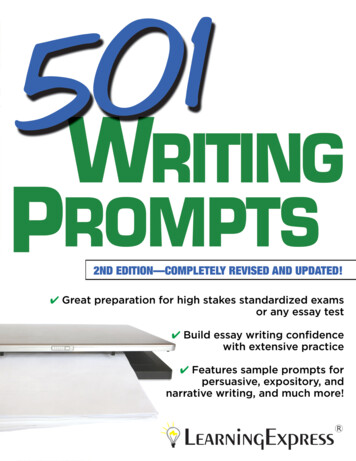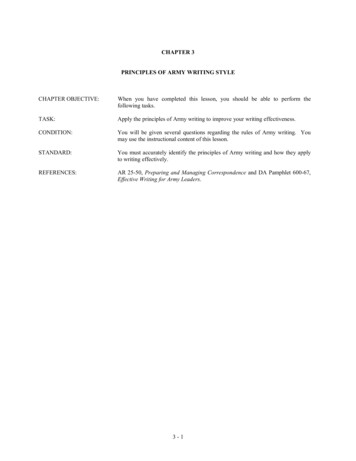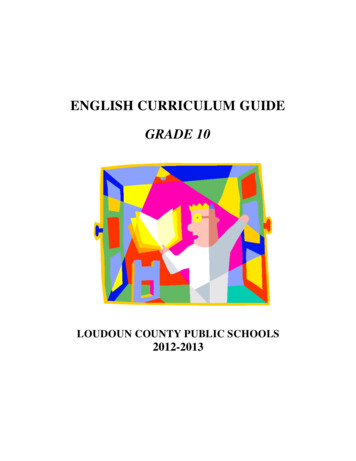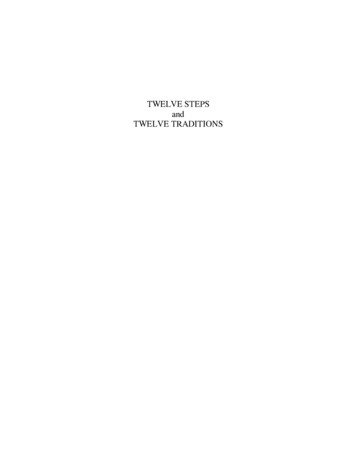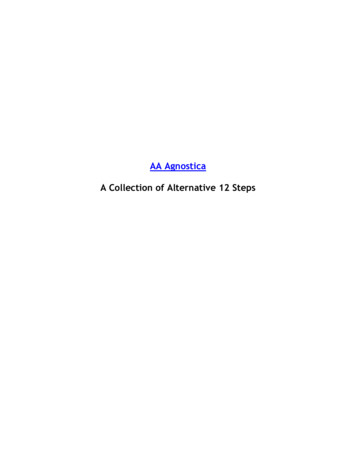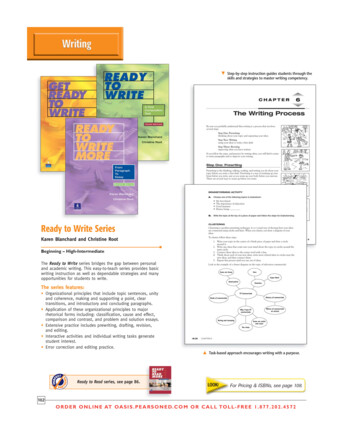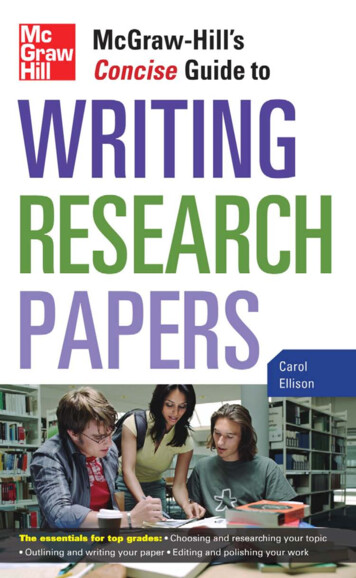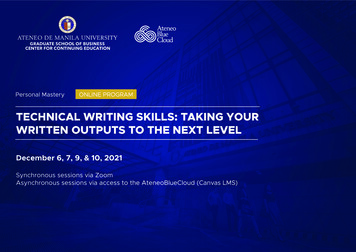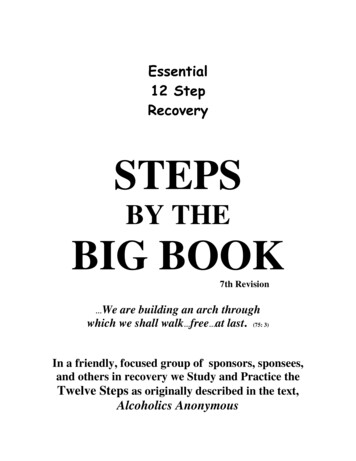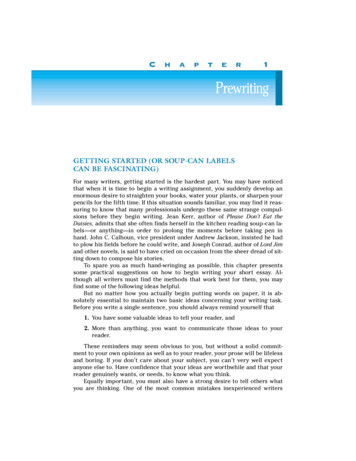
Transcription
C h a p t e r1PrewritingGETTING STARTED (OR SOUP-CAN LABELSCAN BE FASCINATING)For many writers, getting started is the hardest part. You may have noticedthat when it is time to begin a writing assignment, you suddenly develop anenormous desire to straighten your books, water your plants, or sharpen yourpencils for the fifth time. If this situation sounds familiar, you may find it reassuring to know that many professionals undergo these same strange compulsions before they begin writing. Jean Kerr, author of Please Don’t Eat theDaisies, admits that she often finds herself in the kitchen reading soup-can labels—or anything—in order to prolong the moments before taking pen inhand. John C. Calhoun, vice president under Andrew Jackson, insisted he hadto plow his fields before he could write, and Joseph Conrad, author of Lord Jimand other novels, is said to have cried on occasion from the sheer dread of sitting down to compose his stories.To spare you as much hand-wringing as possible, this chapter presentssome practical suggestions on how to begin writing your short essay. Although all writers must find the methods that work best for them, you mayfind some of the following ideas helpful.But no matter how you actually begin putting words on paper, it is absolutely essential to maintain two basic ideas concerning your writing task.Before you write a single sentence, you should always remind yourself that1. You have some valuable ideas to tell your reader, and2. More than anything, you want to communicate those ideas to yourreader.These reminders may seem obvious to you, but without a solid commitment to your own opinions as well as to your reader, your prose will be lifelessand boring. If you don’t care about your subject, you can’t very well expectanyone else to. Have confidence that your ideas are worthwhile and that yourreader genuinely wants, or needs, to know what you think.Equally important, you must also have a strong desire to tell others whatyou are thinking. One of the most common mistakes inexperienced writers
4PART ONE - THE BASICS OF THE SHORT ESSAYmake is failing to move past early stages in the writing process in which theyare writing for—or writing to—themselves only. In the first stages of composingan essay, writers frequently “talk” on paper to themselves, exploring thoughts,discovering new insights, making connections, selecting examples, and so on.The ultimate goal of a finished essay, however, is to communicate your opinionsto others clearly and persuasively. Whether you wish to inform your readers,change their minds, or stir them to action, you cannot accomplish your purpose by writing so that only you understand what you mean. The burden ofcommunicating your thoughts falls on you, not the reader, who is under noobligation to struggle through confused, unclear prose, paragraphs that beginand end for no apparent reason, or sentences that come one after another withno more logic than lemmings following one another to the sea.Therefore, as you move through the drafting and revising stages of yourwriting process, commit yourself to becoming increasingly aware of yourreader’s reactions to your prose. Ask yourself as you revise your drafts, “Am Imoving beyond writing just to myself? Am I making myself clear to others whomay not know what I mean?” Much of your success as a writer depends on anunflagging determination to communicate clearly with your readers.SELECTING A SUBJECTOnce you have decided that communicating clearly with others is your ultimate goal, you are ready to select the subject of your essay. Here are somesuggestions on how to begin:Start early. Writing teachers since the earth’s crust cooled have beenpushing this advice, and for good reason. It’s not because teachers are egoistscompeting for the dubious honor of having the most time-consuming course; itis because few writers, even experienced ones, can do a good job whenrushed. You need time to mull over ideas, organize your thoughts, revise andpolish your prose. Rule of thumb: always give yourself twice as much time asyou think you’ll need to avoid the 2:00 -A.M.-why-did-I-come-to-college panic.Find your best space. Develop some successful writing habits by thinkingabout your very own writing process. When and where do you usually do yourbest composing? Some people write best early in the morning; others thinkbetter later in the day. What time of day seems to produce your best efforts?Where are you working? At a desk? In your room or in a library? Do you startdrafting ideas on a computer or do you begin with paper or a yellow pad? Witha certain pen or sharpened pencil? Most writers avoid noise and interruptions( TV, telephone, friends, etc.), although some swear by music in the background. If you can identify a previously successful writing experience, try duplicating its location, time, and tools to help you calmly address your newwriting task. Or consider trying new combinations of time and place if yourprevious choices weren’t as productive as you would have liked. Recognitionand repeated use of your most comfortable writing “spot” may shorten yourhesitation to begin composing; your subconscious may recognize the pattern
CHAPTER 1 - PREWRITING(“Hey, it’s time to write!”) and help you start in a positive frame of mind. (Remember that it’s not just writers who repeat such rituals—think of the athletes you’ve heard about who won’t begin a game without wearing their luckysocks. If it works for them, it can work for you!)Select something in which you currently have a strong interest. If theessay subject is left to you, think of something fun, fascinating, or frighteningyou’ve done or seen lately, perhaps something you’ve already told a friendabout. The subject might be the pleasure of a new hobby, the challenge of a recent book or movie, or even the harassment of registration—anything inwhich you are personally involved. If you aren’t enthusiastic enough aboutyour subject to want to spread the word, pick something else. Bored writerswrite boring essays.Don’t feel you have nothing from which to choose your subject. Your daysare full of activities, people, joys, and irritations. Essays do not have to bewritten on lofty intellectual or poetic subjects—in fact, some of the world’sbest essays have been written on such subjects as china teacups, roast pig,and chimney sweeps. Think: what have you been talking or thinking aboutlately? What have you been doing that you’re excited about? Or what aboutyour past? Reflect a few moments on some of your most vivid memories—special people, vacations, holidays, childhood hideaways, your first job or firstdate—all are possibilities.Still searching? Make a list of all the subjects on which you are an expert.None, you say? Think again. Most of us have an array of talents we hardly acknowledge. Perhaps you play the guitar or make a mean pot of chili or knowhow to repair a sports car. You’ve trained a dog or become a first-class housesitter or gardener. You know more about computers or old baseball cards thanany of your friends. You play soccer or volleyball or Ping-Pong. In other words,take a fresh, close look at your life. You know things that others don’t . . . nowis your chance to enlighten them!If a search of your immediate or past personal experience doesn’t turn upanything inspiring, you might try looking in the campus newspaper for storiesthat arouse your strong feelings; don’t skip the “Letters to the Editor” column.What are the current topics of controversy on your campus? How do you feelabout open admissions? A particular graduation requirement? Speakers orspecial-interest groups on campus? Financial aid applications? Registrationprocedures? Parking restrictions? Consider the material you are studying inyour other classes: reading The Jungle in a literature class may spark an investigative essay on the hot dog industry today, or studying previous immigrationlaws in your history class may lead you to an argument for or against currentimmigration practices. Similarly, your local newspaper or national magazinesmight suggest essay topics to you on local, national, or international affairsthat affect your life. Browsing the Internet can provide you with literally thousands of diverse opinions and controversies that invite your response.In other words, when you’re stuck for an essay topic, take a closer look atyour environment: your own life—past, present, and future; your hometown;your college town; your state; your country; and your world. You’ll probably5
6PART ONE - THE BASICS OF THE SHORT ESSAYdiscover more than enough subjects to satisfy the assignments in your writing class.Narrow a large subject. Once you’ve selected a general subject to writeon, you may find that it is too broad for effective treatment in a short essay;therefore, you may need to narrow it somewhat. Suppose, for instance, you liketo work with plants and have decided to make them the subject of your essay.The subject of “plants,” however, is far too large and unwieldy for a shortessay, perhaps even for a short book. Consequently, you must make your subject less general. “Houseplants” is more specific, but, again, there’s too muchto say. “Minimum-care houseplants” is better, but you still need to pare thislarge, complex subject further so that you may treat it in depth in your shortessay. After all, there are many houseplants that require little attention. Afterseveral more tries, you might arrive at more specific, manageable topics, suchas “houseplants that thrive in dark areas” or “the easy-care Devil’s Ivy.”Then again, let’s assume you are interested in sports. A 500 -to-800 -wordessay on “sports” would obviously be superficial because the subject covers somuch ground. Instead, you might divide the subject into categories such as“sports heroes,” “my years on the high school tennis team,” “women in gymnastics,” “my love of running,” and so forth. Perhaps several of your categories wouldmake good short essays, but after looking at your list, you might decide that yourreal interest at this time is running and that it will be the topic of your essay.FINDING YOUR ESSAY’S PURPOSE AND FOCUSEven after you’ve narrowed your large subject to a more manageable topic,you still must find a specific purpose for your essay. Why are you writingabout this topic? Do your readers need to be informed, persuaded, entertained? What do you want your writing to accomplish?In addition to knowing your purpose, you must also find a clear focus or direction for your essay. You cannot, for example, inform your readers aboutevery aspect of running. Instead, you must decide on a particular part of thesport and then determine the main point you want to make. If it helps, think of acamera: you see a sweeping landscape you’d like to photograph but you knowyou can’t get it all into one picture, so you pick out a particularly interestingpart of the scene. Focus in an essay works in the same way; you zoom in, so tospeak, on a particular part of your topic and make that the focus of your paper.Sometimes part of your problem may be solved by your assignment; yourteacher may choose the focus of your essay for you by asking for certain specific information or by prescribing the method of development you should use(compare running to aerobics, explain the process of running properly, analyzethe effects of daily running, and so forth). But if the purpose and focus of youressay are decisions you must make, you should always allow your interest andknowledge to guide you. Often a direction or focus for your essay will surface asyou narrow your subject, but don’t become frustrated if you have to discardseveral ideas before you hit the one that’s right. For instance, you might firstconsider writing on how to select running shoes and then realize that you know
CHAPTER 1 - PREWRITINGtoo little about the shoe market, or you might find that there’s just too little ofimportance to say about running paths to make an interesting 500 -word essay.Let’s suppose for a moment that you have thought of a subject that interests you—but now you’re stuck. Deciding on something to write about thissubject suddenly looks as easy as nailing Jell-O to your kitchen wall. Whatshould you say? What would be the purpose of your essay? What would be interesting for you to write about and for readers to hear about?At this point, you may profit from trying more than one prewriting exercise,designed to help you generate some ideas about your topic. The exercises described next are, in a sense, “pump primers” that will get your creative juicesflowing again. Because all writers compose differently, not all of these exercises will work for you—in fact, some of them may lead you nowhere. Nevertheless, try all of them at least once or twice; you may be surprised todiscover that some pump-primer techniques work better with some subjectsthan with others.PUMP-PRIMER TECHNIQUES1. ListingTry jotting down all the ideas that pop into your head about your topic.Free-associate; don’t hold back anything. Try to brainstorm for at least tenminutes.A quick list on running might look like this:funhealthyrelieves tensionno expensive equipmentshoespoor shoes won’t lastshin splintsfresh airgood for heartjogging paths vs. streetshard surfacesmuscle crampsgoing too fargoing too fastsense of accomplishmenttraining for racesboth sexesany age grouprunning with friend or spousetoo much competitiongreat expectationsgood for lungsimproves circulationfirmingno weight losswarm-ups before runcool-downs aftergetting discouragedhitting the wallmarathonsAs you read over the list, look for connections between ideas or one large ideathat encompasses several small ones. In this list, you might first notice thatmany of the ideas focus on improving health (heart, lungs, circulation), butyou discard that subject because a “running improves health” essay is too obvious; it’s a topic that’s been done too many times to say anything new. Acloser look at your list, however, turns up a number of ideas that concern how7
8PART ONE - THE BASICS OF THE SHORT ESSAYnot to jog or reasons why someone might become discouraged and quit arunning program. You begin to think of friends who might have stuck withrunning as you have if only they’d warmed up properly beforehand, chosenthe right places to run, paced themselves more realistically, and so on. Youdecide, therefore, to write an essay telling first-time runners how to start asuccessful program, how to avoid a number of problems, from shoes to tracksurfaces, that might otherwise defeat their efforts before they’ve given thesport a chance.2. FreewritingSome people simply need to start writing to find a focus. Take out severalsheets of blank paper, give yourself at least ten to fifteen minutes, and beginwriting whatever comes to mind on your subject. Don’t worry about spelling,punctuation, or even complete sentences. Don’t change, correct, or delete anything. If you run out of things to say, write “I can’t think of anything to say” untilyou can find a new thought. At the end of the time period you may discover thatby continuously writing you will have written yourself into an interesting topic.Here are examples of freewriting from students who were given ten minutes to write on the general topic of “nature.”STUDENT 1:I’m really not the outdoorsy type. I’d rather be inside somewhere than out in Nature tromping through the bushes. Idon’t like bugs and snakes and stuff like that. Lots of myfriends like to go hiking around or camping but I don’t.Secretly, I think maybe one of the big reasons I really don’tlike being out in Nature is because I’m deathly afraid ofbees. When I was a kid I was out in the woods and ran into aswarm of bees and got stung about a million times, well, itfelt like a million times. I had to go to the hospital for a fewdays. Now every time I’m outside somewhere and something, anything, flies by me I’m terrified. Totally paranoid.Everyone kids me because I immediately cover my head. Ikeep hearing about killer bees heading this way, my worstnightmare come true. . . .STUDENT 2:We’re not going to have any Nature left if people don’t dosomething about the environment. Despite all the mediaattention to recycling, we’re still trashing the planet left andright. People talk big about “saving the environment” butthen do such stupid things all the time. Like smokers whoflip their cigarette butts out their car windows. Do theythink those filters are just going to disappear overnight?
CHAPTER 1 - PREWRITINGThe parking lot by this building is full of butts this morningwhere someone dumped their car ashtray. This campus isfull of pop cans, I can see at least three empties under desksin this classroom right now. . . .These two students reacted quite differently to the same general subject.The first student responded personally, thinking about her own relationship to“nature” (defined as being out in the woods), whereas the second student obviously associated nature with environmental concerns. More freewriting mightlead student 1 to a humorous essay on her bee phobia or even to an inquiryabout those dreaded killer bees; student 2 might write an interesting paper suggesting ways college students could clean up their campus or easily recycletheir aluminum cans.Often freewriting will not be as coherent as these two samples; sometimesfreewriting goes nowhere or in circles. But it’s a technique worth trying. By allowing our minds to roam freely over a subject, without worrying about “correctness”or organization, we may remember or discover topics we want to write about orinvestigate, topics we feel strongly about and wish to introduce to others.3. Looping*Looping is a variation on freewriting that works amazingly well for manypeople, including those who are frustrated rather than helped by freewriting.Let’s assume you’ve been assigned that old standby “My Summer Vacation.” Obviously you must find a focus, something specific and important tosay. Again, take out several sheets of blank paper and begin to freewrite, asdescribed previously. Write for at least ten minutes. At the end of this periodread over what you’ve written and try to identify a central idea that hasemerged. This idea may be an important thought that occurred to you in themiddle or at the end of your writing, or perhaps it was the idea you likedbest for whatever reason. It may be the idea that was pulling you onwardwhen time ran out. In other words, look for the thought that stands out, thatseems to indicate the direction of your thinking. Put this thought or idea intoone sentence called the “center-of-gravity sentence.” You have now completed loop 1.To begin loop 2, use your center-of-gravity sentence as a jumping-off pointfor another ten minutes of freewriting. Stop, read what you’ve written, andcomplete loop 2 by composing another center-of-gravity sentence. Use thissecond sentence to start loop 3. You should write at least three loops andthree center-of-gravity sentences. At the end of three loops, you may find thatyou have focused on a specific topic that might lead to a good essay. If you’renot satisfied with your topic at this point, by all means try two or three moreloops until your subject is sufficiently narrowed and focused.* This technique is suggested by Peter Elbow in Writing Without Teachers ( New York: Oxford University Press, 1975).9
10PART ONE - THE BASICS OF THE SHORT ESSAYHere’s an example of one student’s looping exercise:SUMMER VACATIONLoop 1Center-ofgravitysentenceLoop 2I think summer vacations are very important aspectsof living. They symbolize getting away from daily routines,discovering places and people that are different. When Ithink of vacations I think mostly of traveling somewhere toofar to go, say, for a weekend. It is a chance to get away andrelax and not think about most responsibilities. Just have agood time and enjoy yourself. Vacations can also be a timeof gathering with family and friends.Vacations are meant to be used for traveling.Vacations are meant for traveling. Last summer myfamily and I drove to Yellowstone National Park. I didn’twant to go at first. I thought looking at geysers wouldbe dumb and boring. I was really obnoxious all the way upthere and made lots of smart remarks about getting eatenby bears. Luckily, my parents ignored me and I’m glad theydid, because Yellowstone turned out to be wonderful. It’snot just Old Faithful—there’s lots more to see and learnabout, like these colorful boiling pools and boiling patchesof mud. I got interested in the thermodynamics of the poolsand how new ones are surfacing all the time, and how algaemake the pools different colors.Center-ofgravitysentenceOnce I got interested in Yellowstone’s amazing pools,my vacation turned out great.Loop 3Once I got interested in the pools, I had a good time,mainly because I felt I was seeing something really unusual.I knew I’d never see anything like this again unless I went toIceland or New Zealand (highly unlikely!). I felt like I waslearning a lot, too. I liked the idea of learning a lot about theinside of the earth without having to go to class and studybooks. I really hated to leave—Mom and Dad kidded me onthe way back about how much I’d griped about going on thetrip in the first place. I felt pretty dumb. But I was reallyglad I’d given the Park a closer look instead of holding on tomy view of it as a boring bunch of water fountains. I wouldhave had a terrible time, but now I hope to go back someday. I think the experience made me more open-mindedabout trying new places.Center-ofgravitysentenceMy vacation this summer was special because I was willing to put aside my expectations of boredom and learn somenew ideas about the strange environment at Yellowstone.
CHAPTER 1 - PREWRITINGAt the end of three loops, this student has moved from the general subjectof “summer vacation” to the more focused idea that her willingness to learnabout a new place played an important part in the enjoyment of her vacation.Although her last center-of-gravity sentence still contains some vague words(“special,” “new ideas,” “strange environment”), the thought stated here mayeventually lead to an essay that will not only say something about this student’s vacation but may also persuade the readers to reconsider their attitudetoward taking trips to new places.4. The BoomerangStill another variation on freewriting is the technique called the boomerang,named appropriately because, like the Australian stick, it invites your mind totravel over a subject from opposite directions to produce new ideas.Suppose, for example, members of your class have been asked to writeabout their major field of study, which in your case is Liberal Arts. Begin bywriting a statement that comes into your mind about majoring in the LiberalArts and then freewrite on that statement for five minutes. Then write a second statement that approaches the subject from an opposing point of view,and freewrite again for five minutes. Continue this pattern several times.Boomeranging, like looping, can help writers see their subject in a new wayand consequently help them find an idea to write about.Here’s an abbreviated sample of boomeranging:1. Majoring in the Liberal Arts is impractical in today’s world.[Freewrite for five minutes.]2. Majoring in the Liberal Arts is practical in today’s world.[Freewrite for five minutes.]3. Liberal Arts is a particularly enjoyable major for me.[Freewrite for five minutes.]4. Liberal Arts is not always an enjoyable major for me.[Freewrite for five minutes.]And so on.By continuing to “throw the boomerang” across your subject, you may notonly find your focus but also gain insight into other people’s views of yourtopic, which can be especially valuable if your paper will address a controversial issue or one that you feel is often misunderstood.5. ClusteringAnother excellent technique is clustering (sometimes called “mapping”).Place your general subject in a circle in the middle of a blank sheet of paperand begin to draw other lines and circles that radiate from the original subject.11
12PART ONE - THE BASICS OF THE SHORT ESSAY
CHAPTER 1 - PREWRITINGCluster those ideas that seem to fall together. At the end of ten minutes see ifa topic emerges from any of your groups of ideas.Ten minutes of clustering on the subject of “A Memorable Holiday” mightlook like the drawing on page 12.This student may wish to brainstorm further on the Christmas he spent inthe hospital with a case of appendicitis or perhaps the Halloween he first experienced a house of horrors. By using clustering, he has recollected some important details about a number of holidays that may help him focus on anoccasion he wants to describe in his paper.6. CubingStill another way to generate ideas is cubing. Imagine a six-sided cube thatlooks something like the figure below.Mentally, roll your subject around the cube and freewrite the answers tothe questions that follow. Write whatever comes to mind for ten or fifteen minutes; don’t concern yourself with the “correctness” of what you write.a. Describe it: What does your subject look like? What size, colors, textures does it have? Any special features worth noting?b. Compare or contrast it: What is your subject similar to? What is yoursubject different from? In what ways?c. Free-associate it: What does this subject remind you of? What does itcall to mind? What memories does it conjure up?d. Analyze it: How does it work? How are the parts connected? What is itssignificance?e. Argue for or against it: What arguments can you make for or againstyour subject? What advantages or disadvantages does it have? Whatchanges or improvements should be made?f. Apply it: What are the uses of your subject? What can you do with it?-13
14PART ONE - THE BASICS OF THE SHORT ESSAYA student who had recently volunteered at a homeless shelter wrote thefollowing responses about her experience:a. Describe it: I and five other members of my campus organization volunteered three Saturdays to work at the shelter here in town. We mainlyhelped in the kitchen, preparing, serving, and cleaning up after meals.At the dinners we served about 70 homeless people, mostly men butalso some families with small children and babies.b. Compare or contrast it: I had never done anything like this before so it’shard to compare or contrast it to anything. It was different thoughfrom what I expected. I hadn’t really thought much about the peoplewho would be there—or to be honest I think I thought they would bepretty weird or sad and I was kind of dreading going there after I volunteered. But the people were just regular normal people. And theywere very, very polite to us.c. Free-associate it: Some of the people there reminded me of some of myrelatives! John, the kitchen manager, said most of the people were justtemporarily “down on their luck” and that reminded me of my aunt anduncle who came to stay with us for a while when I was in high schoolafter my uncle lost his job.d. Analyze it: I feel like I got a lot out of my experience. I think I had somewrong ideas about “the homeless” and working there made me thinkmore about them as real people, not just a faceless group.e. Argue for or against it: I would encourage others to volunteer there.The work isn’t hard and it isn’t scary. It makes you appreciate whatyou’ve got and also makes you think about what you or your familymight do if things went wrong for a while. It also makes you feel goodto do something for people you don’t even know.f. Apply it: I feel like I am more knowledgeable when I hear people talkabout the poor or the homeless in this town, especially those peoplewho criticize those who use the shelter.After you’ve written your responses, see if any one or more of them giveyou an idea for a paper. The student who wrote the preceding responses decided she wanted to write an article for her campus newspaper encouragingpeople to volunteer at the shelter not only to provide much-needed help butalso to challenge their own preconceived notions about the homeless in hercollege town. Cubing helped her realize she had something valuable to sayabout her experience and gave her a purpose for writing.7. InterviewingAnother way to find a direction for your paper is through interviewing.Ask a classmate or friend to discuss your subject with you. Let your thoughts
CHAPTER 1 - PREWRITINGrange over your subject as your friend asks you questions that arise naturallyin the conversation. Or your friend might try asking what are called “reporter’s questions” as she or he “interviews” you on your subject:Who?What?Where?When?Why?How?Listen to what you have to say about your subject. What were you most interested in talking about? What did your friend want to know? Why? By talkingabout your subject, you may find that you have talked your way into an interesting focus for your paper. If, after the interview, you are still stumped, question your friend: if he or she had to publish an essay based on the informationfrom your interview, what would that essay focus on? Why?8. The Cross-ExaminationIf a classmate isn’t available for an interview, try interviewing, or crossexamining, yourself. Ask yourself questions about your general subject, just asa lawyer might if you were on the witness stand. Consider using the five categories described below, which are adapted from those suggested by Aristotle,centuries ago, to the orators of his day. Ask yourself as many questions ineach category as you can think of, and then go on to the next category. Jotdown brief notes to yourself as you answer.Here are the five categories, plus six sample questions for each to illustrate the possibilities:1. Definitiona. How does the dictionary or encyclopedia define or explain thissubject?b. How do most people define or explain it?c. How do I define or explain it?d. What do its parts look like?e. What is its history or origin?f. What are some example
make is failing to move past early stages in the writing process in which they are writing for—or writing to—themselves only. In the first stages of composing an essay, writers frequently “talk” on paper to themselves, exploring thoughts, discovering new ins
